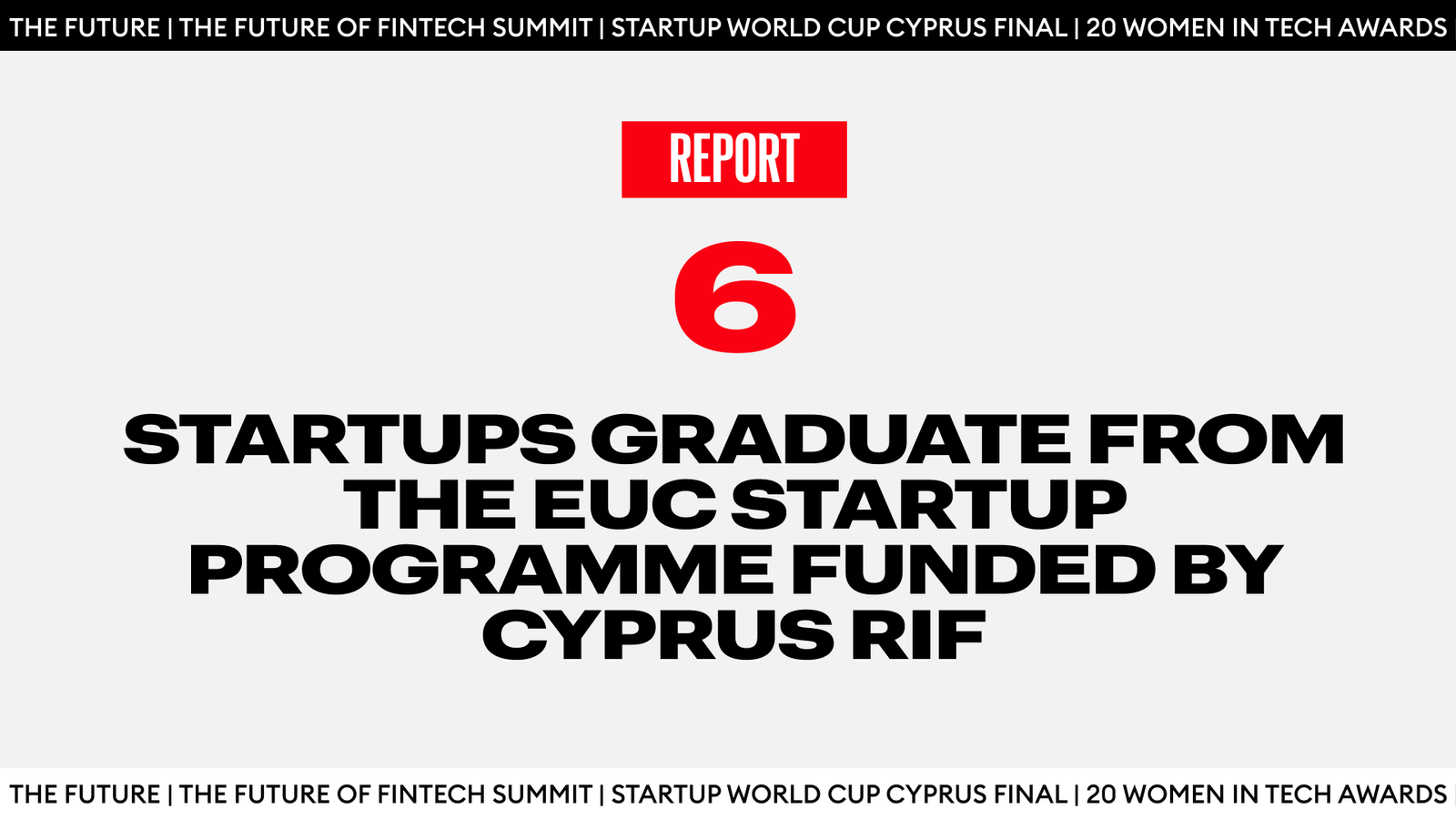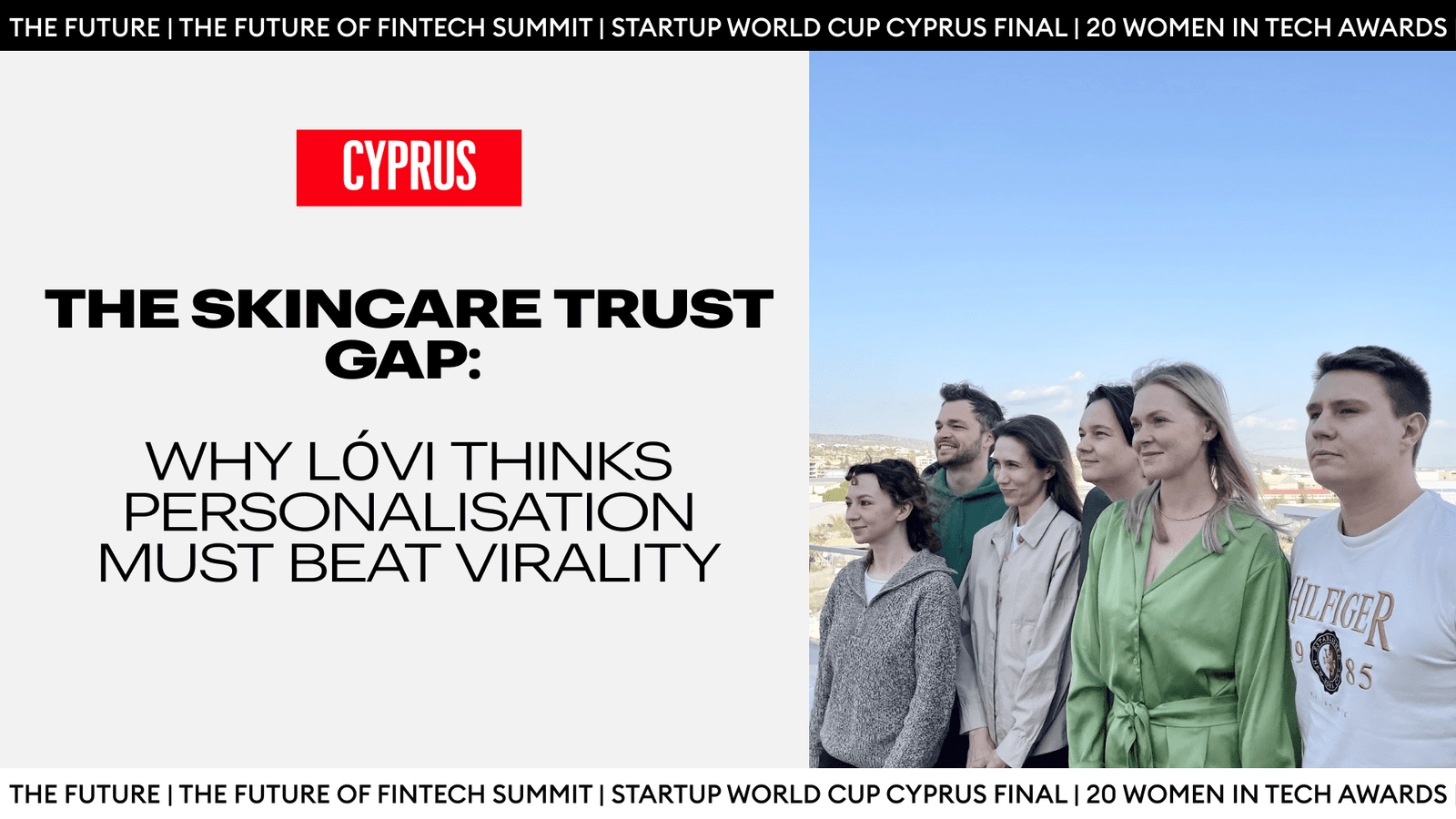On 18 September 2025, a full room gathered at European University Cyprus for the “Cypriot Startups Getting Together: Driving Innovation Through Collaboration” event. The event marked the graduation of six startups from the EUC Startup Programme funded by the Research & Innovation Foundation.
The EUC Startup Programme is delivered by the School of Business at EUC in close collaboration with Microsoft and “Innovation Partners” from the Cypriot industry. Partners contribute expert guidance across ICT, consulting, accounting and tax, EU funding, marketing, media, insurance, banking, alternative investments, and shipping. The model blends structured training with targeted mentoring, market access, and investor exposure. All training, mentoring, and selected Microsoft tools are provided at no cost to the ten startups selected for the cohort. Support is tailored to each company’s stage, from idea to commercialisation.
Follow THE FUTURE on LinkedIn, Facebook, Instagram, X and Telegram
Opening remarks
Rector Prof. Andreas Efstathiou opened the event with a welcome. “And we are very proud here that we are hosting this program for a number of years here at the European University of Cyprus,” he said. He then continues by highlighting the university’s long-term commitment to the programme.
Prof. Dr Pieris Chourides, Dean of the School of Business, set out the programme’s delivery model. He ended his speech with a message to present and future startups entering the program. “Not everybody will be successful. What we can guarantee is that we will deliver on what we set out to do. We gave you the best instructors, the best mentors, and of course, the best coordinator for you. We are going to be here supporting you, and would like you to be our ambassadors in the years to come.”
Stephani Theophanous, Head of Entrepreneurship and Start-ups at GrantXpert, provided a short overview of the programme. She emphasised how the success of the startups was a personal matter for all involved. “After all these months and the very hard work of the startups, we’re very happy to say that most of them are now generating sales and they are also attracting private investment,” she added.
The graduates
Bolsterup is the first digital ecosystem that brings all the players of the construction industry together under one roof, providing a digital blueprint of completed and upcoming projects, featuring contributors, their capabilities, products, and services.
Insavior is a safety app designed to protect and empower women through technology and community. It offers seven key features, including an SOS button and real-time location sharing, to provide immediate support in critical situations. Backed by a growing community of over 2,500 women in Cyprus and Greece, its mission is to eliminate the bystander effect and create a safer world through collective action and solidarity.
Freyia Labs is a deeptech foodtech startup based in Cyprus. They are developing F.O.R.S.E.T.I.X., a machine-learning-powered platform that helps food and beverage producers optimise their fermentation processes. Beyond the software, their mission is to be part of rebuilding food systems that are intelligent, inclusive, and waste-free.
Park in Town is building a smart parking network that helps facilities go digital, attract more users, and streamline their operations. For drivers, the app offers real-time availability, reservation, and in-app payments, making the parking experience faster, easier, and stress-free.
Mammocheck provides women with control over their breast health by offering a non-invasive, contactless, and painless method for performing breast cancer examinations at home.They offer a device that is compatible with a smartphone application, which leverages artificial intelligence to monitor breast health as frequently as desired, without the need for exposure to ionizing radiation.
Multians (creators space) unites top multimedia creators and operates as a content production agency aligned with the goals of businesses in tech, finance, and real estate. Multians is also a dynamic creator space that empowers content creators to connect, collaborate, learn, distribute, and monetize their work. With access to tools, resources, and a strong network, we help creators thrive across industries.
Panel discussion: policy, capital, and execution
A highlight of the evening was the thought-provoking panel discussion by key figures in the startup and funding ecosystem.
Moderator Dr Celia Hadjichristodoulou opened with a simple question. Has Cyprus’ startup scene progressed over the past six years? Andreas Panayi, Co-Founder of Kinisis Ventures, answered first. “It’s unfair to say yes, it’s unfair to say no. Yes, in some areas, yes. In some areas, we go backwards,” he said. He pointed to gaps that still slow teams down. “Where Cyprus lacks is experience, resources, and capital. When you combine all three, it creates a much larger problem. Especially when you are looking for VC funding from outside of Cyprus. You are competing with folks that exited three times, or even two times, or even once.”
Theodoros Loukaidis responded from a policy angle and from his experience as the director of RIF. He recalled how the term “startup” was once unfamiliar.
“If I go back twenty years, the word ‘startup’ was unknown and even for some, a dirty word. Since then, we’ve made great progress, and that’s the result of not just funding programs from the Research & Innovation Foundation but also incentives that the government of Cyprus has introduced,”
he said
He stressed that public programs build early capability, not permanent support. “We are here to facilitate, we’re here to help you grow up to a certain stage, but then we have to push you into the private markets.”
The conversation moved to research commercialisation. Maria Markidou Georgiadou, managing director of Cyprus Seeds, described two recurring hurdles she sees with spin-outs. “The first is the mindset,” she said. Many researchers complete support cycles and then stay at the university. “The second challenge is the regulatory framework in Cyprus,” especially for public universities. She called for a clear, transparent path that lets teams capitalise on their IP.
She also added the importance of delegation and team collaboration. “As a researcher, your job is to come up with scientific research. That’s the area of your expertise. It doesn’t mean you should also be the CEO. Stop trying to do everything. It’s very important to create a team around you with multidisciplinary and complementary skills.”
The moderator then asked how investors decide who to invest in. Andreas Panayi gave a crisp response. “I am looking for a reason not to invest. Because if you cannot find that then you invest.”
Advice and key takeaways
Pangratios Vanezis, board member of KPMG, focused on disciplined risk-taking. “You have to do more to actually save,” Pangratios Vanezis said. He pressed founders to stop funding projects that do not work. “Do you continue to invest in failing projects instead of abandoning them?” His closing line urged startups to push through challenges:
“Stay on the problem. You will find the solution.”
Andreas Panayi urged people to build within companies if that fits better. “An entrepreneur can be someone who joins a company. You may not be the person who drives, but you can be the person who actually makes it happen.”
Theodoros Loukaidis’s advice was short but poignant:
“Fail fast, fail safe.”
Maria Markidou Georgiadou encouraged early market contact. “Be prepared to go early to the market. And then go back again and go back again.”
With the closing of the evening, six teams leave European University Cyprus’s RIF-funded programme and enter the market, seeking customers, corporate pilots, and private capital.














